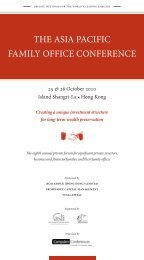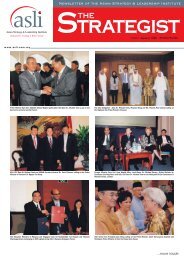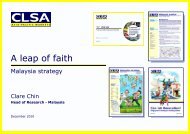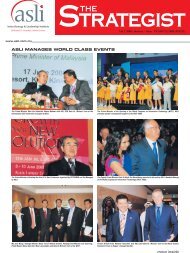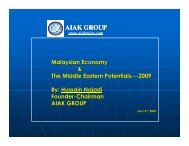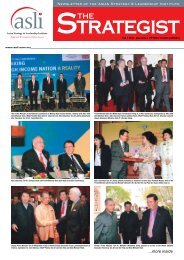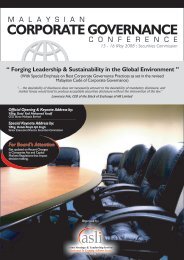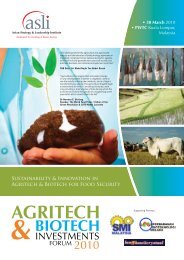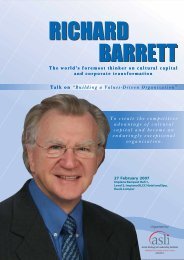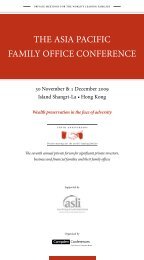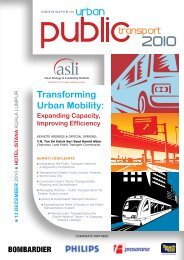This is a report of the proceedings of - Asian Strategy & Leadership ...
This is a report of the proceedings of - Asian Strategy & Leadership ...
This is a report of the proceedings of - Asian Strategy & Leadership ...
- No tags were found...
Create successful ePaper yourself
Turn your PDF publications into a flip-book with our unique Google optimized e-Paper software.
THE ASIA THINK TANK DIALOGUE REPORTRebuilding Confidence, Restoring Livelihoods Session Three 27What Next? – Programmes for ActionPoverty eradication called for concerted efforts by Governments, Civil Society, Think Tanks and Business towork toge<strong>the</strong>r in a collective strategic partnership. Rural empowerment and SME involvement could facilitatepoverty eradication and improve <strong>the</strong> incomes <strong>of</strong> rural households. <strong>Th<strong>is</strong></strong> session built on <strong>the</strong> two previous sessionsto generate ideas and free-flowing solutions towards <strong>the</strong> improvement <strong>of</strong> rural livelihoods and to identifyspecific programmes and projects that could be implemented. Some questions were ra<strong>is</strong>ed: How to improverural incomes and <strong>the</strong> wealth <strong>of</strong> <strong>the</strong> rural population? How to improve rural healthcare, education, waterand utilities? What programmes and projects could be launched and funded? What could individuals do by<strong>the</strong>mselves and collectively to improve <strong>the</strong> livelihood <strong>of</strong> rural communities?Mr. Benjamin Quinones, JrChairman, CSRME Asia / Institute <strong>of</strong> Small ScaleIndustries, University <strong>of</strong> <strong>the</strong> Philippines, Manila.Commenting on <strong>the</strong> case for a new worldorder, Mr. Quinones said th<strong>is</strong> called fora system <strong>of</strong> coordination and workingtoge<strong>the</strong>r, with continuing dialogue amongcountries, each taking responsibility to streng<strong>the</strong>n<strong>the</strong>ir commitments, and <strong>the</strong> need to look at mentalmodels. He highlighted <strong>the</strong> prime importance <strong>of</strong> <strong>the</strong>old economy, which was to make pr<strong>of</strong>it. The idea <strong>of</strong><strong>the</strong> market adjusting automatically was based on <strong>the</strong>idea <strong>of</strong> <strong>the</strong> free market but he now proposed a newparadigm which would enable <strong>the</strong> participation <strong>of</strong> allstakeholders, each <strong>of</strong> whom would have a say in <strong>the</strong>model going forward. <strong>Th<strong>is</strong></strong> line <strong>of</strong> thinking, he said, hadled to <strong>the</strong> evolution <strong>of</strong> social entrepreneurship or socialenterpr<strong>is</strong>e, which <strong>is</strong> a natural organ<strong>is</strong>ation where goodsare produced and traded for social and environmentalpurposes and not for pr<strong>of</strong>it alone. <strong>Th<strong>is</strong></strong> Non-Pr<strong>of</strong>it modelfor doing business remained in <strong>the</strong> social responsibilitysphere, but in exchange, trading and banking, itwas not yet recognized as a sector, despite its activeparticipation in <strong>the</strong> economy. NPOs provided a thirdleg <strong>of</strong> <strong>the</strong> economy, he said, and complemented <strong>the</strong>government and <strong>the</strong> traditional pr<strong>of</strong>it sectors.For instance, he said, Fair Trade enabled marginal<strong>is</strong>edand small producers to become big players, encouragedfair participation <strong>of</strong> children, promoted gender equality,provided a safe and healthy environment for workers,and produced fair pr<strong>of</strong>it. He noted that <strong>the</strong> NPO modelwas not against pr<strong>of</strong>it but required that pr<strong>of</strong>its made hadto be equitable, without jeopard<strong>is</strong>ing <strong>the</strong> environmentand o<strong>the</strong>r factors. Mr. Quinones concluded by makinga number <strong>of</strong> important points:• There was a need for better coordination anddialogue whereby stakeholders would go deep into<strong>the</strong>ir mental models, readjust <strong>the</strong>ir understanding <strong>of</strong>things, especially in agriculture, and agree what itmeans to <strong>the</strong> domestic economy as a whole.• There was a need for greater socialentrepreneurship.• Value-chain development was greatly required forsocial enterpr<strong>is</strong>e as one had to think not only aboutenterpr<strong>is</strong>e development but also to take stock <strong>of</strong><strong>the</strong> whole value chain.• The poor were valuable partners in building sociallysoundenterpr<strong>is</strong>es• Social enterpr<strong>is</strong>e was <strong>the</strong> best model for m<strong>is</strong>sionorientedinstitutions.



